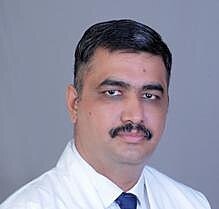
M.B.B.S., L.T.M.M.C., G.H., D.N.B. (Neurosurgery)
Since August 2015, I have been serving as a Consultant Neurosurgeon and Spine Surgeon at Indraprastha Apollo Hospitals, New Delhi. In June 2022, I transitioned to Apollo Hospitals Navi Mumbai, and in June 2024, I rejoined Indraprastha Apollo Hospitals. Additionally, I hold the position of Honorary Neurosurgeon at Tirath Ram Shah Charitable Hospitals, Delhi. In the past, I have had the honor of being associated with Yatharth Super Speciality Hospitals, Chikitsa Noida Medical Center, Apollo Hospitals Noida, and Inlaks Hospitals, Mumbai.

Epilepsy is a central nervous system (neurological) disorder in which brain activity becomes abnormal, causing seizures or periods of unusual behavior, sensations and sometimes loss of awareness.
Anyone can develop epilepsy. Epilepsy affects both males and females of all races, ethnic backgrounds and ages.
Seizure symptoms can vary widely. Some people with epilepsy simply stare blankly for a few seconds during a seizure, while others repeatedly twitch their arms or legs. Having a single seizure doesn't mean you have epilepsy. At least two seizures without a known trigger (unprovoked seizures) that happen at least 24 hours apart are generally required for an epilepsy diagnosis.
Treatment with medications or sometimes surgery can control seizures for the majority of people with epilepsy. Some people require lifelong treatment to control seizures, but for others, the seizures eventually go away. Some children with epilepsy may outgrow the condition with age.
Because epilepsy is caused by abnormal activity in the brain, seizures can affect any process your brain coordinates. Seizure signs and symptoms may include:
Symptoms vary depending on the type of seizure. In most cases, a person with epilepsy will tend to have the same type of seizure each time, so the symptoms will be similar from episode to episode.
When seizures appear to result from abnormal activity in just one area of your brain, they're called focal seizures. These seizures fall into two categories:
Seizures that appear to involve all areas of the brain are called generalized seizures. Six types of generalized seizures exist.
Epilepsy has no identifiable cause in about half the people with the condition. In the other half, the condition may be traced to various factors, including:
M.B.B.S., L.T.M.M.C., G.H., D.N.B (Neurosurgery)
My Neurosurgical Training in Chennai (2003-2008) involved working in the prestigious Neurosurgical unit at Voluntary Health Services Hospital. I had the honor of starting with and being the last student of Prof. B. Ramamurthi, the first Neurosurgeon of India, who established this institute after superannuation from Madras Medical College. Thereafter, I worked under Dr. Chandrashekhar Deopujari and Dr. Uday Andar at Bai Jerbai Wadia Hospital for Children, Mumbai (2009 – 2011).
Dr. Amit Kapoor
Indraprastha Apollo Hospital
Tirath Ram Shah Hospital
Happy Healing Polyclinic
Apollo Hospital, Noida
dramitkapoor@yahoo.com
+91-8448449837
©2022 Dr. Amit Kapoor, All Right Reserved.
